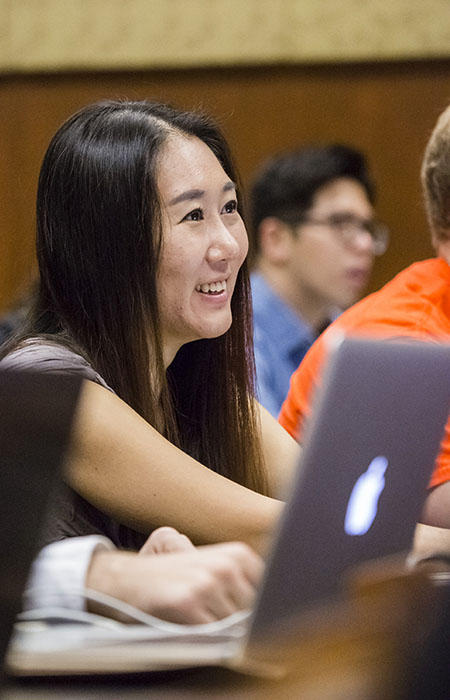
The MATESOL degree is intended to prepare candidates to be professional leaders in the many roles that teachers play:  classroom instructor, peer coordinator, teacher preparation, curriculum and materials developer, program administrator, etc. To this end, the curriculum is designed to provide candidates with an understanding of the structure of the English language, a familiarity with the dominant theories of language learning/teaching, insights into how language proficiency is best developed in different individuals, and practical approaches and experiences that are central to the development of candidates as teachers of English as an international language.
classroom instructor, peer coordinator, teacher preparation, curriculum and materials developer, program administrator, etc. To this end, the curriculum is designed to provide candidates with an understanding of the structure of the English language, a familiarity with the dominant theories of language learning/teaching, insights into how language proficiency is best developed in different individuals, and practical approaches and experiences that are central to the development of candidates as teachers of English as an international language.
Why Choose MATESL at Illinois?
Illinois was ranked in 2018 as the 37th most prestigious university in the world (Times Higher Education World University Ranking) and as the 7th Best Value University in the US by Forbes. Illinois is the home of 24 Nobel and 28 Pulitzer Prize winners.
A History of Excellence:
The first ESL course taught on campus was English for Foreign Students in 1947 by Helen Beveridge (Brennan). This was soon followed by additional courses and

the creation of The Program in English for Foreign Students in 1955. The first language lab for English language learners was opened in 1956, and the official title of courses for these students was changed to English as a Second Language in 1965. The MATESL degree was first approved by the Illinois Board of Trustees in 1966, with the first graduate, Katherine Eaton, completing her degree in June, 1967. This makes Illinois MATESL the oldest existing degree of this type in the nation. Today, the program has well over 1,500 graduates, many of whom are teaching today across the globe.
An International Focus:
The University of Illinois has one of the largest international populations in the United States, with well over 10,000 students from abroad, representing 116 countries. We currently maintain over 400 cooperative agreements with international institutions in more than 60 countries across the globe.
Hands-on Experience:

The large international population at Illinois means that the faculty, staff, and students in the MATESL program currently supervise over 1,000 international students each semester taking one of our 16 ESL writing, pronunciation, ITA, or elective courses. All of these ESL courses are taught either by Lecturers (many of them graduates from our program) or by students enrolled in the MATESL degree. This gives most of our students the opportunity to immediately put into practice what they are learning from their professors. This also gives many of our graduates vital employment experience needed to ensure excellent jobs in our field upon completing the degree.
Unparalleled Resources:
The Department of Linguistics is located in the Foreign Language Building, which sits directly on the Main Quad of the campus (seen in the first two images in this packet). Students in the MATESL program have access to both the Henry and Renée Kahane Linguistics Research Room and also the Helen Brennan Memorial TESL Library, which holds thousands of volumes related to teaching ESL and EFL. The department hosts a number of Laboratories and Research Groups as well as Reading and Discussion Groups focused on a variety of topics that any students may attend.
The University of Illinois at Urbana-Champaign is home to one of the largest

public university libraries in the world, with more than 24,000,000 volumes in over 20 area studies libraries across our campus. Our libraries include almost 1,000 databases on almost any topic imaginable. In addition to the many print and electronic resources, the Main Library includes resources like The Media Commons, a VR Lounge, a fully equipped Audio Production Studio, a fully supported Video Production Studio, and also self-use Audio and Video Booths. All of these are freely accessible to any student.
How to Apply
We look forward to all applications to the MATESOL program! The details just below should answer many of your questions, but if you have more, feel free to email us at any time through the Departmental email address: linguistics@illinois.edu. Details about 'how' to apply and what should be included in your application may be found on the page linked below.

Background Requirements
- must completed a Bachelor's degree; an undergraduate major in linguistics, English, a foreign language, or education is generally recommended though other majors are also acceptable.
- must present a grade point average of at least 3.0 (on a 4.0 scale) for the last 60 semester hours of undergraduate work.
- (for all English language learners entering the MA program) must have a score of 100 or higher on the Test of English as a Foreign Language (TOEFL iBT). These scores are required for all English language learners entering the MATESL program regardless of where they did their undergraduate work. Also, upon arrival on campus for their first semester's work, English language learners must take the UIUC English as a Second Language Placement Test (EPT). The results of this test will determine whether the particular student will have to take one or more English language courses in addition to the other MATESL courses required for the MATESL degree.
- (all applicants) must have had two years of a foreign language or have become proficient in a second language in some other way. Furthermore, they must have taken an introduction to Linguistics. These prerequisites must be met prior to, or as soon as possible after the student's arrival on campus. Work done in meeting these prerequisites does not, of course, count toward the credits required for the degree itself.
Financial Aid
Nearly all of the UIUC MATESOL students are the beneficiaries of some form of financial aid for at least part of the time they spend working on their degree. Most degree candidates with native or native-like competence in English receive appointments as graduate assistants teaching English in the ESL Service Courses or in the Intensive English Institute for at least two academic years. In addition, there are a limited number of library and laboratory assistantships open to MATESL students; the assistantships offered to English language learners require proof of near-native English speaking ability. If you are an English language learner applicant for a teaching job in ESL, you must present a TOEFL Speaking Score (or an equivalent score in IELTS) of 26 (or greater) for full consideration.
The most common form of Financial Aid for the MATESOL program is in the form of a 33% Teaching Assistantship. This means that students with the TA position will teach one section of ESL per semester (approximately 3 hours of teaching per week), with additional hours devoted to lesson preparation, grading, office hours, meetings, etc. All Assistantships of at least 25% include a full waiver of the university tuition cost and almost all student fees. They also include a monthly salary.
There is a separate financial aid application process for each academic term. Fall and Summer applications are processed together, usually in March or April of each year. Spring applications are processed typically on October or November of the previous year. Please check back at this webpage from time to time, to see if new financial aid forms are posted for a forthcoming semester.
All newly admitted MATESL students are automatically considered for financial aid for their first semester of study. There is no separate financial aid application system as part of the admission application. After arrival, all MATESOL students must re-apply for financial aid each semester, regardless of any guarantee of longer-term awards (e.g., in the admission letter). This re-application allows MATESL students to indicate if they wish to teach a different class.
The Department welcomes applicants from other campus degree programs.
General Degree Requirements
The program of study leading to the MATESOL degree requires candidates to complete a minimum of 40 hours with a grade point average (GPA) of 3.00 or higher (B or better). Twelve of the forty hours must be taken from 500-level courses (that is, graduate only). These forty hours may include up to eight hours of thesis credit (EIL 599). In addition to coursework, students must complete either a Comprehensive exam for each of the required courses or a Master's Thesis (more information on these below).
Core Course Requirements: 32 Hours
|
Course # |
Course Title |
Credits |
When offered |
|
EIL 512 |
Practicum in Teaching ESL |
4 |
Spring only |
|
EIL 422 |
English Grammar for ESL Teachers |
4 |
Fall & Summer |
|
EIL 445 |
Second Language Reading & Writing |
4 |
Spring only |
|
LING 450 |
Sociolinguistics 1 |
4 |
Fall only |
|
EIL 460 |
Principles of Language Testing |
4 |
Fall, Spring, & Summer |
|
EIL 488 |
Phonology for L2 Teachers |
4 |
Spring only |
|
EIL 489 |
Theoretical Foundations of SLA |
4 |
Fall, Spring, & Summer |
|
EIL 587 |
Technology-Infused Language Teaching |
4 |
Fall only |
Elective Courses: 8 Hours
|
Course # |
Course Title |
Credits |
When offered |
|
various |
various |
4 |
various |
|
various |
various |
4 |
various |
Applicants must satisfy prerequisites for entry into the program. All applicants for admission to the MATESOL Program must have taken a college level introduction to linguistics and must have at least two years of a foreign language. In addition, applicants must have also taken a basic course in language teaching methods and materials. These prerequisites may be satisfied by courses taken after becoming a student at the university, if necessary; however, credit for courses taken to satisfy curriculum prerequisites does not count toward the 40 hours necessary for the MATESL degree itself.
Comprehensive Exams or The Master's Thesis
As noted above, all students must complete either the Comprehensive Exams or a Master's Thesis in order to graduate from the program. This decision is partially made based on your own preferences (some people definitely have no interest in a thesis), but the option to do a thesis is also determined by your performance in the program and your continuing satisfactory progress on that thesis.
Comprehensive Examination
Approximately one-half of the students in the MATESOL program compete the degree requirements by successfully passing the Comprehensive Exams. See here for Comprehensive Examination details.
MATESL Thesis Option

For students who have a strong interest in research (whether theoretical or pedagogical) completing a thesis would be an excellent goal.
For information pertaining to the MATESOL Graduate Program Thesis Option, please refer to the links below:
- What do you need to do? Thesis Information
- When would you need to do it? MA Thesis Checklist
- What have other MATESL students done? There are many great samples of theses written by graduates from our MATESOL program available on the MATESOL Library website.
Additional Thesis resources (items with * are books available in the MATESOL library)
- MA Thesis Information from Graduate College
- Writing in the Social Sciences: A very nice brief handout
- * Cohen, L., Manion, L., & Morrison, K. (2018). Research Methods in Education (8th ed.). New York: Routledge.
- *Mallinson, C., Childs, B., Van Herk, G. (2018). Data Collection in Sociolinguistics: Methods and Applications (2nd ed.). New York: Routledge.
- *Pearson Casanave, C., 2014). Before the Dissertation: A textual mentor for Doctoral students at early stages of a research process. Ann Arbor: University of Michigan Press.
- *Pearson Casanave, C. (2020). During the Dissertation: A textual mentor for Doctoral students in the process of writing. Ann Arbor: University of Michigan Press.
- *American Psychological Association. (2020). Publication Manual of the American Psychological Association (7th Edition).

Additional Possibilities with your MATESOL Degree
Many of our MATESOL students take advantage of other educational opportunities while on campus that can easily be incorporated into their time in our program. A few of them are linked below:
-
Specialization in Writing Studies (see below)
-
Graduate Minors
-
Center for Innovation in Teaching and Learning Certificates
Specialization in Writing Studies
Within the pedagogical and research tracks, candidates may choose to use their elective units to develop a Specialization in Writing Studies (SWS), an option approved jointly by Linguistics and the Center for Writing Studies (CWS). The requirements for such a specialization are the following:
Course Requirements
- ENGL 505/C&I 563 Writing Studies I
- ENGL 506/C&I 564 Writing Studies II
- EIL 445 Second Lang Reading and Writing
Research/Elective Requirements
- Candidates who qualify for and choose to write a master's thesis under MATESOL guidelines (See Master's Thesis document)
- must include on their thesis committee, as thesis director, a MATESOL faculty member affiliated with CWS;
- must focus the thesis on a topic related to pedagogy, administrative problems, or research on a writing-related topic in the context of second language research. Students may develop and test instructional materials, design and evaluate an administrative procedure or program, or design and conduct a research project;
- must prepare a formal proposal describing the research, to be submitted to a MATESOL faculty member affiliated with CWS for approval at least six weeks prior to the start of the project;
- must deposit the Master’s Thesis in the Writing Studies Office within two weeks of completion; and
- must complete all requirements stated in the Master's Thesis document
-
Candidates who do not write a master's thesis may choose one of the following two options:
Option A: take one additional non-MATESOL course in Writing Studies, chosen from the list approved by CWS and DEIL for the specialization in Writing Studies (see page 2 for this list)
Option B: conduct a Master’s Project by completing a four-hour EIL 591 independent study under the direction of a MATESOL faculty member affiliated with CWS. The EIL 591 independent study must result in a Master’s Project that, when completed, would be deposited in the Writing Studies Office within two weeks of its completion. The Master's Project must be related to pedagogy, administrative problems, or research on a writing-related topic in the context of second language research. Students may develop and test instructional materials, design and evaluate an administrative procedure or program, or design and conduct a research project.
Frequently Asked Questions(FAQs)
1. If I am denied, can I be automatically re-considered for admission next year?
The Department of Linguistics does not automatically re-consider denied applicants. You would need to fully re-apply.
2. If I am denied, what can I do to help my chances for admission in a subsequent year?
The decision process for admission to the MATESOL is complex. We consider a large number of factors. In the past, people who were denied and then successfully admitted in a subsequent year did some or all of the following:
- Some took TESOL training courses at another institution. For example; denied applicants who live in Champaign-Urbana took TESL courses at Parkland College. They completed these courses with a high GPA, and they provided us with a transcript from those courses, new letter(s) of reference from instructor(s) in those courses, or both.
- Some obtained teaching experience relevant to the UIUC MATESOL.
- Some international applicants produced increased TOEFL or IELTS scores. The term ‘TOEFL Score’ here refers to the results on the entire TOEFL test, including the essay exam and the speaking component of the new iBT.
3. If I am admitted and wish to delay my admission to a later year, may I do so?
Yes. At UIUC, this Is known as 'recoding'. We will recode your admission to the subsequent year upon your request.
UIUC has two technical definitions of ‘recode’. The first is ‘recode for admission’ and the second is ‘recode for consideration’.
The Department of Linguistics grants a ‘recode for admission’ to any admitted applicant who requests it. We will only do this for up to one subsequent year. If you are admitted and wish to wait for more than one year, or if you request an additional delay beyond that first subsequent year, you will have to fully re-apply.
Financial aid is never assured for a recode. You will be fully re-evaluated for financial aid for the subsequent year.
International students who are recoded are viewed as ‘recode for admission’ by the Department of Linguistics, but UIUC requires that we classify them as ‘recode for consideration’. This is because we need to re-establish the financial support necessary to generate an I-20 and get a student visa.
We do not usually recode for less than a year, given the nature of our program and the advising cohorts by which MATESOL students move through the course sequence. In rare cases, an exception may be granted. For example, the applicant may live in Champaign-Urbana, be a student at UIUC in another degree program and be able to take some of our courses while enrolled in that program. Recodes for less than one year require that the applicant be present for and attend our August new-student orientation. See the answer to item (9) below.
4. If I am admitted and recoded for one year, is there any additional evidence I should provide to heighten my chances of getting financial aid?
See the answers to item (2) above - generally, you can revise your application dossier to include any intervening experience, new letters of reference, a new statement of purpose, and so forth.
On this point, please bear in mind the cycle of review for admissions and for financial aid. UIUC’s academic year begins in mid-August. We evaluate new MATESOL applicants and continuing on-campus students for financial aid commencing as early as the previous March. If you have been recoded and wish to provide additional or revised evidence for your admissions dossier, please send it to us no later than March 1st.
5. If recoding for a year means I still have to (re)compete for financial aid, what is the real advantage to doing so?
This is a complex question.
Some MATESOL applicants are self-funded and/or have funding from other sources and/or are competing for funding from other sources, and they do not wish to apply for financial aid from us. This funding from other sources may not be fully available until the subsequent year.
Some MATESOL applicants are requesting funding from us in combination with either personal or outside funds, and full funding may be better in a subsequent year.
Some MATESOL applicants - although admitted - wish to teach or obtain other experience in the intervening year to substantially impact the Department’s consideration for financial aid in the subsequent year.
Regardless, certain advantages to recoding are clear - you do not have to pay the application fee again, and some elements of your application dossier do not need to be re-submitted.
6. I am an international student. If I am denied and wish to re-apply in a subsequent year, or if I am admitted and wish to be recoded for re-consideration in a subsequent year, do I have to retake the TOEFL or IELTS?
See the reply to question (2) above. The first consideration is whether or not you can obtain higher TOEFL results in the intervening year. If so, that is a good reason to re-submit it. However, there is another important consideration: UIUC requires that TOEFL scores be no older than two years, dated from the projected start of your studies. Hence, if you re-apply (from deny) or recode for re-consideration (from admit), your TOEFL score may go out of date.
7. I am an international applicant. Is a speaking test score required for my admission dossier?
Please submit the full set of test results from whatever test you submit for admissions: TOEFL, iBT TOEFL, IELTS, or Duolingo
Per UIUC policy, a TOEFL speaking score of at least 24 is required for all those who wish to TA.
See here for information on English requirements for admission, and English requirements to become a teaching assistant.
8. If I am admitted and I have (or will have) completed some of the courses required in the MATESL, do I have to take those courses again?
This typically arises with students who do an undergraduate degree at UIUC and who complete either one of our TESL minors or the State of Illinois teacher endorsement course sequence (which involves some EIL courses).
UIUC does not permit a student to fulfill requirements for two degrees with the same course work (called 'double-dipping'). Hence, if you took any EIL courses and counted them toward some other UIUC degree, they cannot also count toward the MATESOL degree.
The Department of Linguistics does not require that you repeat any courses. So if you took a particular EIL course during a previous UIUC degree, you would not have to take that course again while a MATESL candidate. You would have to fill in the credit hours for that course. This means that you could take an elective.
One exit option for the MATESOL is a set of comprehensive examination questions. If you choose this option, and if you did one of the EIL courses during a previous degree, you will still have to fulfill the comps task for that course. For this reason, some students (who enter the MATESOL with a few prior EIL courses) find it beneficial to sit in on a given class again, especially if it has been some time since taking the EIL course in question.
9. Am I required to take the Graduate Record Examination (GRE) as part of my admission requirements?
No. This score is optional.
10. I’ve been admitted. I’ve accepted the admission. I’ve got several months before I arrive. Is there any pre-requisite work I could do?
Congratulations! We look forward to meeting you.
The MATESOL curriculum has two pre-requisite courses: a general introduction to linguistics and an introduction to TESOL methodology. These courses do not count toward the 40 hours required for the degree. If you have not taken such courses within five years of the start date of your MATESOL, consider taking these pre-requisites before you arrive on campus. Courses that satisfy both pre-requisites are offered online by the Department of Linguistics at UIUC: EIL 486 - Linguistics for Language Teachers, and EIL 411 - Introduction to TESOL Methodology. Alternatively, if your time and location permits, try to find such courses nearby (e.g. at a local college or institution). Get information about the courses - a description, the name of the textbooks, a syllabus if possible. Contact us and share that information with us. We can determine if the courses meet our pre-requisites, and if they do, you could get those courses out of the way prior to arrival.
However, it is generally not a good idea to seek a course equivalent to one of the required EIL MATESOL courses.
Other than that, the best thing you can do in the forthcoming months is to get some English teaching experience: even if as a volunteer. Or you might consider the opportunity offered in point 11 below.
11. I’ve applied for the MATESL degree. It will be several months before I hear whether or not I have been accepted. Is there any EIL coursework I could do online now to shorten the time I would need to stay on campus for the degree?
Yes! The Department of Linguistics offers several EIL courses online. At this time, one will satisfy the curriculum pre-requisite for an introduction to linguistics, mentioned in the answer to question 11 - EIL 486 - Linguistics for Language Teachers. (Courses taken to fulfill curriculum prerequisites do not count toward the 40 hours required for the degree, and are therefore not transferrable.) Other EIL courses apply directly to fulfilling requirements in the MATESOL program: (a) EIL 489 - Theoretical Foundations of SLA; (b) EIL 422 - English Grammar for ESL Teachers; (c) EIL 460 - Principles of Language Testing.. By taking several of these courses online (up to 12 hours total), you could potentially shorten your on-campus time (usually two years) by as much as one semester. For more information about these courses, availability, and tuition, please see this listing.